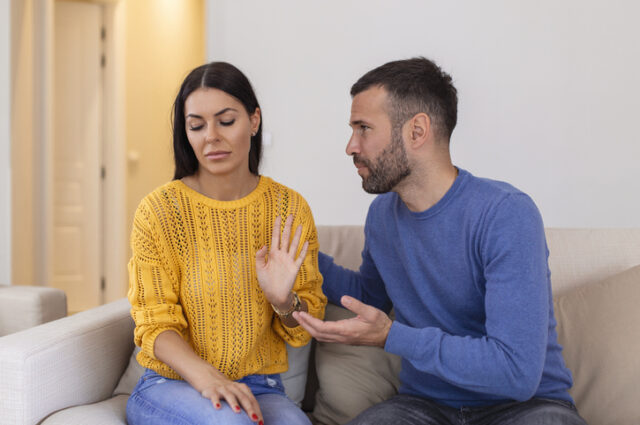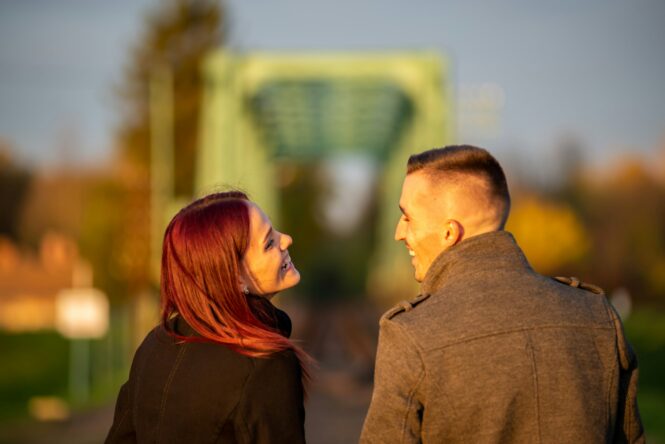We might both speak a version of English, but when it comes to social etiquette, things don’t always translate so smoothly between Brits and Americans.

What seems perfectly normal across the pond can come off as downright rude over here, leaving us cringing while Americans remain completely unaware. From conversation faux pas to unexpected behaviours in public spaces, these little cultural differences can cause all sorts of awkward moments. If you’re an American visiting Britain, here are some things you might be doing that we actually find a bit rude.
1. Being overly friendly to strangers

Americans are known for their warmth and enthusiasm, which often extends to people they’ve just met. Striking up a conversation with the person next to you in a queue or showering a shop assistant with compliments feels totally normal in the U.S. Over here, that kind of friendliness can come off as a bit much. We’re all about more polite but reserved interactions with strangers, and excessive chattiness can make them uncomfortable rather than welcome.
2. Talking loudly in public places

Americans tend to have a naturally louder speaking voice, which isn’t an issue at home but can feel jarring in the UK. Whether on public transport, in a café, or even just walking down the street, speaking at full volume is often considered intrusive. We generally prefer to keep their conversations at a lower, more discreet level, and a booming voice in a quiet train carriage is likely to earn some disapproving side-eye.
3. Being too direct in conversation

Honesty is important, but we tend to wrap our feedback in layers of politeness. Americans, on the other hand, are often more direct, saying exactly what they think without sugarcoating. To Brits, this can come across as blunt or even a bit rude. A simple, “That’s not a good idea” might be softened over here to something more like, “I see where you’re coming from, but maybe we could try something else?”
4. Calling people by their first name too soon

In America, first-name terms are the default, no matter if you’ve just met someone or if they’re your doctor, professor, or boss. But in Britain, this can feel overly familiar, especially in formal settings. We tend to ease into first-name usage, often waiting until the other person suggests it. Using titles like “Dr.” or “Mr./Ms.” is still seen as a sign of respect in many situations.
5. Over-the-top enthusiasm

Excitement and positivity are great, but we’re a bit more low-key when expressing them. While Americans might respond to good news with a big “Oh my god, that’s amazing!” Brits might just say “Oh, that’s nice” and mean it just as much. Huge reactions can sometimes feel a little forced or insincere to British sensibilities, which lean towards understated expressions of excitement.
6. Tipping too much

In the U.S., tipping generously is expected and seen as a way to acknowledge good service; in the UK, where service staff are generally paid a proper wage, tipping isn’t as ingrained in the culture. Leaving a massive tip in a pub or a coffee shop can actually make us feel a bit awkward. A 10-15% tip in restaurants is plenty, and in many casual places, it’s not expected at all.
7. Asking overly personal questions

Americans are often open about discussing their job, salary, or even personal struggles with people they’ve just met. In this country, these topics can feel a little intrusive. Asking someone what they do for work is fine, but diving straight into how much they earn, or their political beliefs can feel inappropriate. We tend to keep things more surface-level until they’ve built a closer relationship.
8. Smiling at strangers

In many parts of the US, it’s normal to smile at someone as you walk past them, even if you don’t know them. It’s a friendly gesture meant to spread positivity. In the UK, this kind of spontaneous smiling can leave Brits confused, wondering, do I know them? Are they trying to sell me something? A polite nod is fine, but anything more might seem unusual.
9. Over-apologising without meaning it

Americans say “I’m sorry” when they truly mean it. Brits, however, use apologies as a social lubricant, even when we’ve done nothing wrong. If an American bumps into someone and says, “Excuse me,” instead of “Sorry,” it might feel a bit cold to a Brit. A small thing, but one that can make interactions feel a little off.
10. Cutting in line (even accidentally)

Queueing is practically a sacred tradition in Britain—it’s a way of maintaining order, and we care about that. There’s an unspoken rule that you wait your turn, no exceptions. Americans, used to a more fluid approach, might accidentally stand in the wrong spot or not realise there’s a system in place. Even unintentional queue-jumping is enough to make us fume—just expect some passive-aggressive huffing and pointed glares if you break this rule.
11. Oversharing too soon

Americans tend to be open books, happy to share details about their personal lives early on. Us? Not so much. Getting too personal, too fast can make Brits feel uncomfortable. While Americans might bond over life stories, we prefer to slowly reveal details over time. A friendly chat is fine, but getting deep too quickly can feel overwhelming.
12. Talking about money
 Source: Unsplash
Source: Unsplash Discussing finances openly is far more common in America, where people might casually mention how much they spent on their house or what they make in their job. Over here, money talk is still largely seen as impolite. Asking how much someone paid for something or bringing up your own earnings can feel boastful or invasive. We tend to keep financial matters private unless it’s with close friends or family.
13. Saying “Have a nice day” too enthusiastically

In the US, ending an interaction with a big, cheery “Have a nice day!” is completely normal. In this country, it can feel a little over-the-top. We prefer a more understated approach, like a simple “Cheers” or “Take care.” While the sentiment is appreciated, an overly enthusiastic goodbye can sometimes feel a bit forced.
These little differences don’t mean Americans are actually being rude—it’s just a cultural contrast that can take some getting used to. At the end of the day, we may find these things mildly annoying, but we also love to have a good laugh about them. And if you ever want to blend in, just remember: keep it polite, keep it subtle, and whatever you do, never cut in line.




